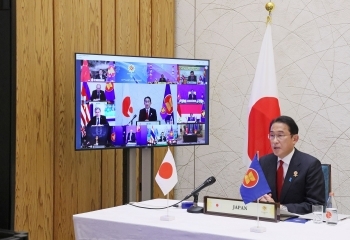Asia
The 16th East Asia Summit (EAS)
 East Asia Summit (EAS) 1
East Asia Summit (EAS) 1(Photo: Cabinet Public Affairs Office)
 East Asia Summit (EAS) 2
East Asia Summit (EAS) 2(Photo: Cabinet Public Affairs Office)
On October 27, commencing at 8:00 p.m. for about 2 hours and 10 minutes, Mr. KISHIDA Fumio, Prime Minister of Japan, attended the 16th East Asia Summit (EAS) which was held via video conference and chaired by His Majesty Sultan Haji Hassanal Bolkiah of Brunei Darussalam. An overview of the meeting is as follows.
1. Opening Remarks
In his remarks, Prime Minister Kishida said that he will work with EAS Leaders to vigorously advance a "free and open Indo-Pacific." He also stated that he was encouraged that ASEAN had exercised its centrality and unity and made its own guidance clear by issuing the "ASEAN Outlook on the Indo-Pacific (AOIP)" at the recent time when the rule-based order is being shaken and regional instability has become apparent.
2. Support for countermeasures against COVID-19 pandemic
Prime Minister Kishida expressed his intention to continue to enhance cooperation toward the realization of fair and equitable access to effective, safe and high-quality vaccines and the establishment of a robust and inclusive healthcare system, through assistance such as the provision of vaccines to ASEAN countries, "Last One Mile Support," and support for the establishment of the ASEAN Centre for Public Health Emergencies and Emerging Diseases.
3. ASEAN Outlook for the Indo-Pacific (AOIP)
Prime Minister Kishida then stated that Japan highly valued the AOIP, which upholds values such as openness, transparency, inclusiveness, and the rule of law. He reiterated full support for AOIP, which shares the fundamental principles with the "Free and Open Indo-Pacific (FOIP)." He said that Japan and ASEAN were currently advancing concrete cooperation, based on the ASEAN-Japan Joint Statement of AOIP Cooperation, which contribute to the principles of AOIP, , and that Japan had just issued a Progress Report on 73 concrete cooperation projects.
4. Regional and International Affairs
On regional and international affairs, Prime Minister Kishida stated as follows.
- (1) East China Sea/South China Sea
While stating that it is in their common interest to make the Indo-Pacific a free and open sea, Prime Minister Kishida shared serious concerns with the other countries including ASEAN and strongly opposed that there are continued activities that violate Japan's sovereignty in the East China Sea and in the South China Sea, actions that are against the rule of law and other activities that raise tensions are being taken. He stated that the Code of Conduct (COC) on the South China Sea should be in line with the United Nations Convention on Maritime Law and should respect the legitimate rights and interests of all stakeholders using the South China Sea. He also stated the importance of peace and stability in the Taiwan Strait. Furthermore, he expressed his strong opposition to any economic coercion.
Other countries also commented on the importance of freedom of navigation and flight over the South China Sea, and on the importance of the peaceful resolution of disputes in line with international law, including the United Nations Convention on the Law of the Sea. - (2) Hong Kong and the Xinjiang Uyghur Autonomous Region
Prime Minister Kishida expressed serious concerns about the situation in Hong Kong and the human rights situation in the Xinjiang Uyghur Autonomous Region.
Other countries also expressed serious concerns about the situation in Hong Kong and the human rights situation in some regions including the Xinjiang Uyghur Autonomous Region. - (3) North Korea
Prime Minister Kishida stated that North Korea launched ballistic missiles this month and that the peace and security of the region and international community is under threat. He also stated that the full implementation of the United Nations Security Council resolutions, including "ship-to-ship transfer" measures, is essential to achieve the complete, verifiable and irreversible dismantlement (CVID) of all weapons of mass destruction and ballistic missiles of all ranges of North Korea. In addition, he asked for the continued understanding and cooperation of all countries toward the immediate resolution of the abductions issue.
The participating countries also made remarks on the importance of denuclearization in the Korean Peninsula and the full implementation of the United Nations Security Council resolutions. - (4) Myanmar Situation
Prime Minister Kishida expressed his deep respect to Brunei and other ASEAN’s efforts on issue of the Myanmar and stressed again the position of the Government of Japan that it strongly urges the stop of violence, the release of those who are detained and the restoration of Myanmar’s democratic political system. He also urged Myanmar to constructively respond in order to enable the visit of ASEAN Special Envoy Dato Erywan to Myanmar as soon as possible. In addition, he mentioned that, to turn around the situation, Japan intends to deal with the issue upholding engagement as a key principle, to continue to fully support ASEAN’s efforts and to actively provide humanitarian assistance.
The participating countries also mentioned the importance of cooperating for the swift implementation of the "Five-Point Consensus" and humanitarian assistance to the people of Myanmar.
5. Conclusion
Finally, Prime Minister Kishida stated that EAS is a premier forum where the leaders of each country frankly discuss regional political security issues, and that Japan will continue to advance cooperation through the EAS framework.


